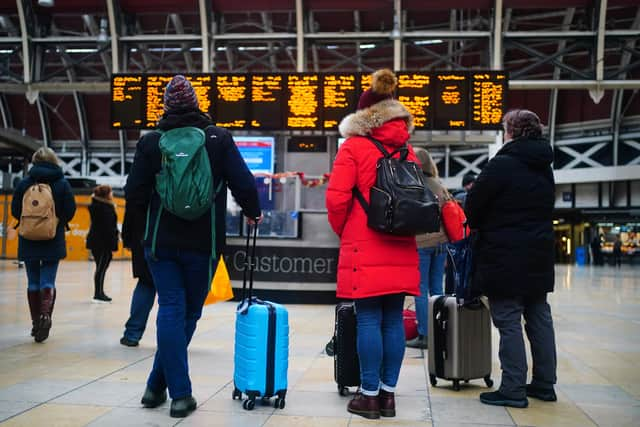Train strikes December: TSSA announces more Christmas holiday strike dates in row over pay
and live on Freeview channel 276
Rail workers’ union the TSSA has announced extra strike action during the Christmas holiday as staff at more train companies walk out in a row over pay, jobs and conditions.
Members of the Transport Salaried Staffs Association will take action at West Midlands Trains (WMT) and Great Western Railway (GWR) on Wednesday 28 December, holding a 24-hour walkout from noon. The latest action comes just days after the TSSA confirmed its members would go on strike at CrossCountry on Boxing Day and 27 December, bringing more disruption for commuters.
Advertisement
Hide AdAdvertisement
Hide AdThe union said it believes the walkouts will severely affect services at the three operators, which covers large swathes of the country, from Penzance in Cornwall, to London the Midlands, Wales, and Scottish cities as far north as Aberdeen. The action replaces strikes at CrossCountry and WMT by the TSSA on 17 December which have now been cancelled.
The TSSA is demanding a guarantee of no compulsory redundancies, no unagreed changes to terms and conditions, and a pay increase which addresses the rising cost of living.


TSSA organising director Nadine Rae said: “Our members do not want to strike, especially over the Christmas holiday period, but they are sick and tired of being taken for granted. They deserve a pay rise to help manage the escalating cost of living, and they rightly demand job security.
“Train operators under the control of the Department for Transport, need to face up to the fact that only serious offers which meet our aspirations will end this dispute.
Advertisement
Hide AdAdvertisement
Hide Ad“Rail workers are seeking basic fair treatment: not to be sacked from their jobs; a fair pay rise in the face of a cost-of-living-crisis; and no race to the bottom on terms and conditions.
“Make no mistake – we will again see trains coming to a halt unless rail bosses and the government do the right thing for our members and our precious rail network which so many people rely on.”
RMT begins wave of 48-hour strikes
The latest TSSA strikes come as train services are severely disrupted after members of the Rail, Maritime and Transport (RMT) union walked out in the first of a wave of 48-hour strikes on Tuesday (13 December).
Around half of Britain’s rail lines were closed on Tuesday and Wednesday, with trains in other areas only running between 7.30am and 6.30pm. Many places had no services at all, including most of Scotland and Wales. The same disruption is expected Friday and Saturday this week, with reduced services expect on days around the strikes.
Advertisement
Hide AdAdvertisement
Hide AdThe RMT union at Network Rail and 14 train companies are striking in a bitter row over jobs, pay and conditions after Network Railworkers rejected a fresh pay offer.
With further walkouts planned, Network Rail has warned there will be significantly reduced services – with trains more crowded and likely to start later and finish earlier – until 8 January. RMT workers at Network Rail will also strike from 6pm on Christmas Eve until 6am on 27 December, disrupting getaway journeys and maintenance work.
RMT general secretary Mick Lynch apologised for the impact of rail strikes on passengers and said the union is working to reach an agreement to end the dispute.
He said: “We don’t like disrupting the public and we apologise for the disruption that’s being caused. I believe we could have worked towards a settlement a couple of weeks ago until that was undermined by the stance that certain people have taken.
Advertisement
Hide AdAdvertisement
Hide Ad“So we do apologise and we hope that people can amend their plans and get to where they need to go during this period, but they can be assured that we’re working to try and get an agreement so that we can end this dispute.
“Many people of course that are travelling are also suffering similar things – health workers, postal workers, people working in all sorts of industries and sectors who are suffering the same issues of low pay, conditions being stripped out, and attacks on their job security. So if we can stick together across the working class we can maybe get some settlements that they can support and we can get back to work and run society in a better way.”
Comment Guidelines
National World encourages reader discussion on our stories. User feedback, insights and back-and-forth exchanges add a rich layer of context to reporting. Please review our Community Guidelines before commenting.
